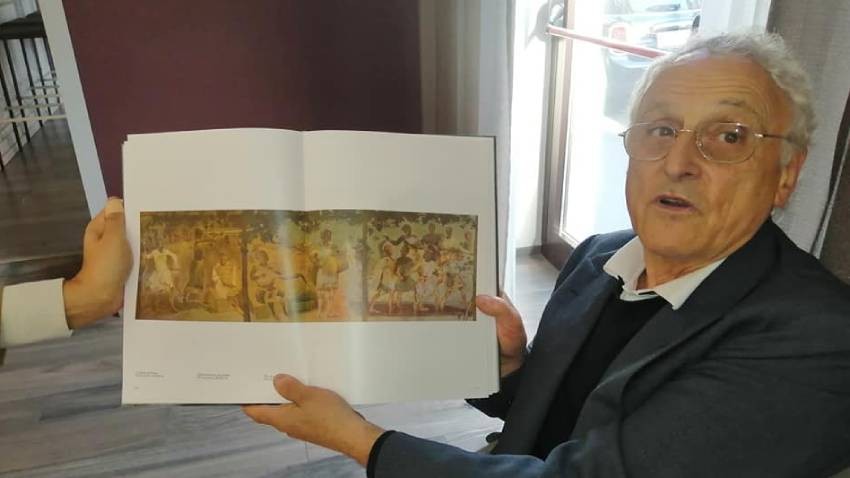As a young child, he listened to the family legend about Levsky and in his imagination he painted a picture of daring, determination, courage to the limit.
In 1971, the artist Alzek Misheff crossed the Iron Curtain to freely practice art, a right he was denied in his own country. In his escape, he risked being shot at the Yugoslav-Italian border. From the town of Acqui, where he settled in Italy, he now often takes imaginary trips to his homeland, resurrecting memories of his childhood.
"My great-grandfather Ivan was an icon painter, but he also painted the Ottoman army wagons," - says Alzek Misheff. In this way he could communicate the plans and whereabouts of the Ottomans to Levski, who was hiding in a large empty barrel in the house in Kocherinovo. That's what my grandmother used to tell me and all her grandchildren when we were very young. But what impressed me the most was how an artist would take on the role of a spy and conspire and stage plots. When Grandpa Ivan was captured, they were forcing him to convert to the Turkish faith. However, he asked the four kadis (judges - ed.) with long beards, in Turkish of course, "Which is stronger, truth or religion?"

They looked at him and, impressed by my great-grandfather's conceptual thinking, released him, refusing to send him to Diyarbakir prison. This is our family history with Levski, which is part of our memories for the fourth generation."
Through these stories about his great-grandfather Ivan, the icon painter who became a politician after the Liberation, the artist is convinced that it was his grandmother who predetermined his path in art. With her fascinating stories, the elderly woman fed his imagination, urging him to create images and empathise with events, but also requiring him to show her 20 of his drawings every day. In her eldest grandson, she sees a descendant of Ivan, who painted some of the frescoes in the Rila Monastery.
"Grandpa Ivan was also a public figure, unlike me," Alzek Misheff continues his story. – After the Liberation he was a long-time mayor of Kocherinovo and as such was elected deputy in the first National Assembly.
He also founded an experimental agricultural field and even bought a hail cannon from Vienna. Another interesting fact is that he was excommunicated from the Orthodox Church, not because he did not believe in Christianity, but because as mayor he took the land of the Turks who had left the village and gave it to the poor. This, however, did not please the nearby monastery, which probably wanted to take possession of the entire Rila riverbed, so the mayor's gesture ruined their plans."
The thirst for freedom is an instinct and is not conditioned by the circumstances in which you had the good fortune or misfortune to be born - believes the heir of the family."Freedom is painted when you look at life around you, and at the opportunity to do something for others," he says.
Freedom is also to spark discussion around long established postulates with your queries. For example, whether a religious work commissioned by locals for the church in their village can be described as contemporary art. "It's happened to me twice already - is that freedom?" asks the artist who has painted large images of St George and St Anne for two neighbouring Italian villages. And he gives the answer himself: "I believe it is."

"Spirituality is in the great thousand-year-old art - Alzek Misheff is convinced. - Through modernity, we think that if things are evolving, we should abandon the ones of the past. But since, according to Christianity, we are made and exist by God's will, I seem in my advanced years to be looking for the lasting, eternal values."
On the day the Orthodox Church celebrates the Feast of St. Archangel Michael, the National Archaeological Reserve "Deultum-Debelt" will mark 1,160 years since the Christianization of the Bulgarian people. The event will be attended by Vice..
In his latest exhibition, Nikolay Buzov follows the principles of calligraphic art, offering a polyphony of abstract symbols and signs. His canvases emanate the sense of ease and freedom with which he creates his geometric structures. “The title..
On November 11 at 6:30 p.m., the Consulate General of Bulgaria in New York will host a special screening of a short film (18 min.) dedicated to the 120th anniversary of the prominent Bulgarian intellectual, composer and pianist Dimitar Nenov . During..

+359 2 9336 661
